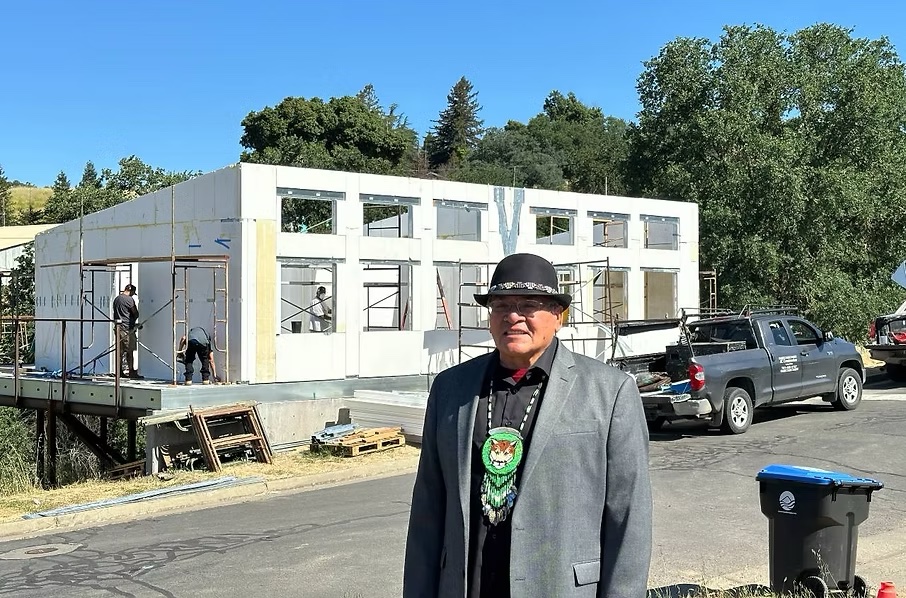
- Details
- By Chez Oxendine
- Energy | Environment
A solar microgrid designed to power 36 homes on the Guidiville Rancheria stalled this spring when federal funds were abruptly frozen — until philanthropic lenders stepped in to bridge the gap.
The Guidiville Rancheria was awarded a $3.55 million grant under the Bureau of Indian Affairs’ Tribal Electrification Program in 2023. The award covers stakeholder engagement, planning, workforce development and installation of a solar microgrid to support 20 homes and 16 units for homeless residents.
Work on the primary equipment for the project — a shipping-container sized graphene storage system with 1.5 megawatts of capacity — and a 550-kilowatt solar array began in early 2025. The system will store excess energy generated from ground installations and rooftops before drawing from backup reserves. It also includes technology that converts atmospheric water to hydrogen for additional energy storage and rooftop solar on new energy-efficient homes.
But in March, the BIA froze the rancheria's grant award without explanation, jeopardizing the project and violating contract terms and federal trust obligations, according to Energy Manager Michael Derry. The freeze came after interconnection applications and equipment deposits were already underway.
"We went to draw down funding for the project to pay some bills and it just wasn't there — we got a message that with the change of administration, funding had been clawed back," Derry said. "We were lucky to have an energy team with some good connections, because they were able to identify some philanthropy sources to fill some of those gaps created by the administration."
The energy team included 7Skyline, a Portland, Ore.-based clean energy consulting firm that connected the rancheria with San Diego-based nonprofit BQuest Foundation, which backs housing and climate-related projects in underserved communities. BQuest specializes in bridge financing for renewable energy projects and has funded more than 100 similar projects over the past six years, according to its website.
BQuest, along with nonprofits Meyer Memorial Trust, Hammond Climate Solutions Foundation and Direct Relief, stepped up their tribal energy program support to fill funding gaps. BQuest provided roughly $1 million through a bridge loan to help keep the Guidiville project moving forward without interruption.
“While we work with BIA to resolve this issue, BQuest's support ensures we stay on schedule,” Guidiville Rancheria Vice Chair Magdaline Warden said in a statement.
7Skyline Founder and Principal Jennifer Rouda said the BQuest Foundation was one of several organizations that had “stepped up” in the wake of potential disruptions to Indian Country's green energy sector.
“These lenders are raising their hands and asking to participate, so that these projects can keep momentum and get built,” Rouda said.
BIA funding has since resumed, but with "new conditions that weren't there before" and an uncertain timeline, Derry said. With that uncertainty, the tribe is now racing to complete the microgrid and disconnect the 36 units from the wider grid.
“We can argue whether or not the federal government can or should, but we know from living in Indian Country that the federal government breaks its own rules every day,” Derry said. “But the equipment's been ordered and contracts have been signed, so we have to finish it.”
The project will reduce costs, improve reliability, and mitigate fire risk, Derry added. The microgrid is part of the tribe's broader vision of self-sufficiency across energy, housing, water, and communications for the federally recognized tribe with lands near Ukiah, Calif.
Sheiyenne Baloo-Seegmiller, finance and tax project manager at 7Skyline, said the deal with BQuest demonstrated the need to give tribes flexibility around federal funding issues.
“It shows innovation and natural resilience in these tribes to go looking toward other options, and it's encouraging to see non-Native organizations willing to work with them,” Baloo-Seegmiller said.
Bridge financing has become essential for tribal governments navigating delayed or rescinded federal funding — especially under the Trump administration’s retreat from clean energy. Guidiville’s funding freeze previewed a broader shift that became law on July 4, putting pressure on community lenders and philanthropic partners to fill gaps once covered by federal sources. In response, impact investors and foundations are ramping up support for energy initiatives in Indian Country.
“There are revolving loan funds out there with funds earmarked for energy, and now they're thinking about tribes,” Rouda said. “These new partnerships are promising.”
Brian Edwards contributed reporting.
